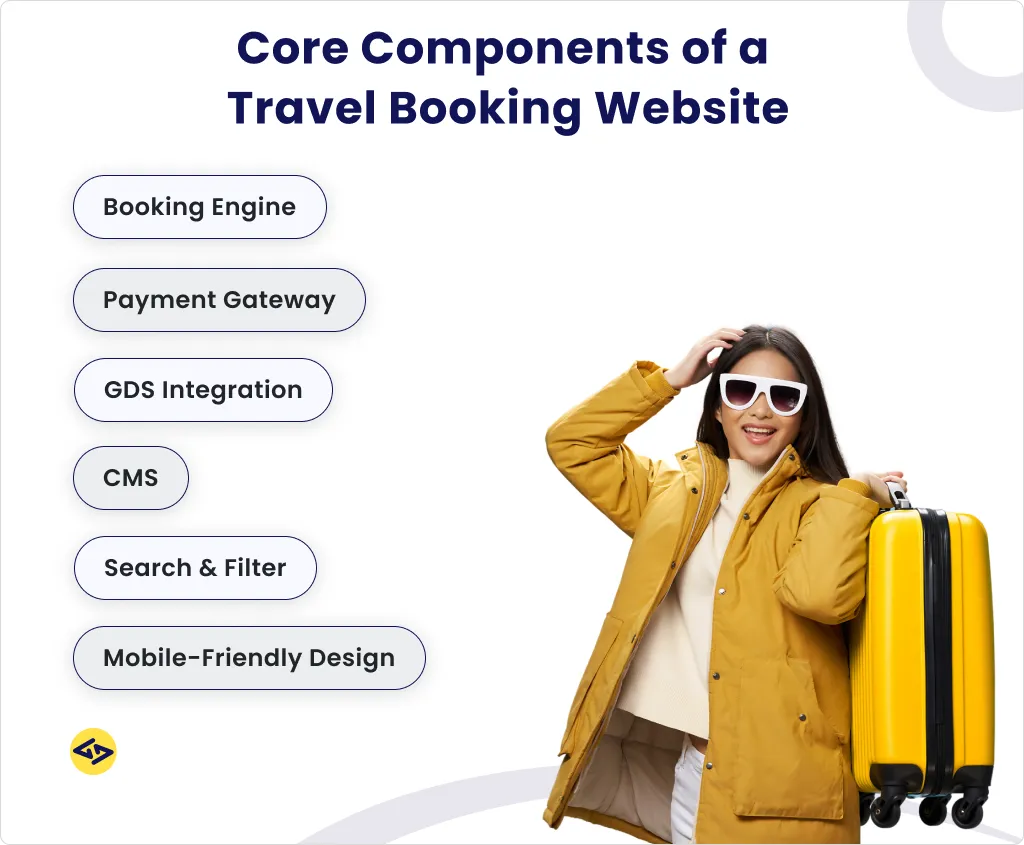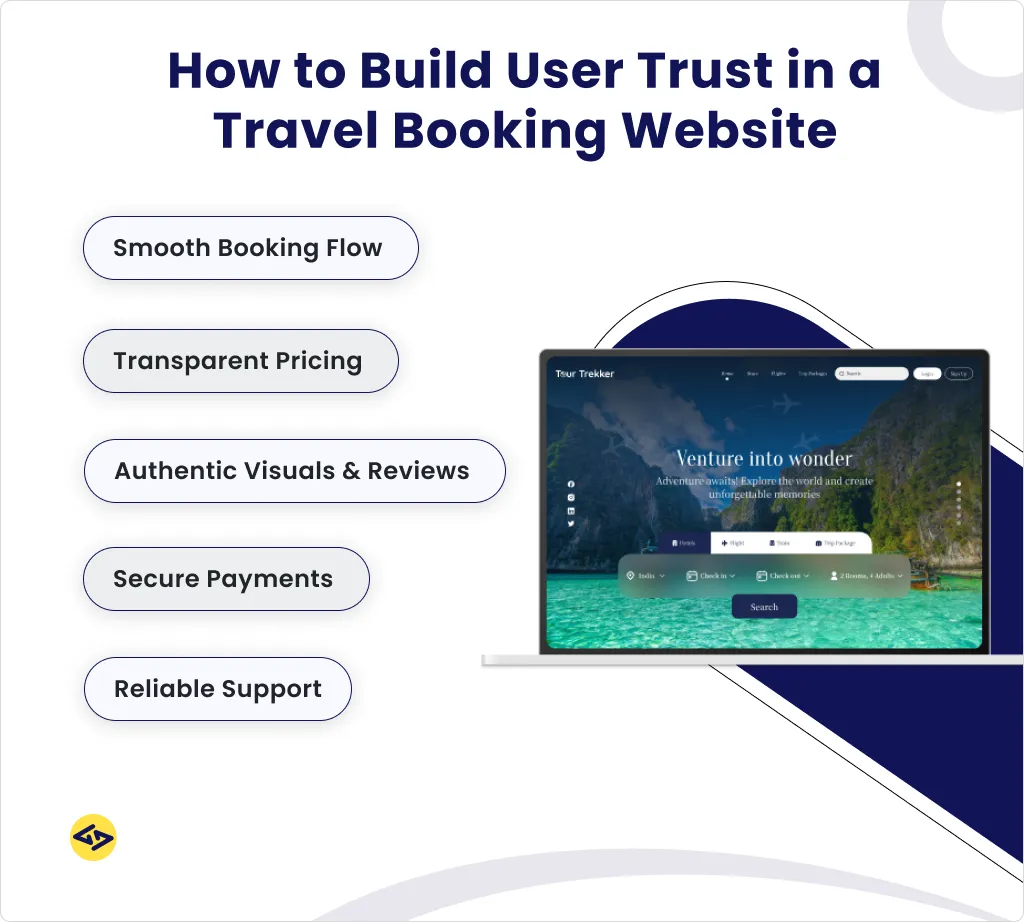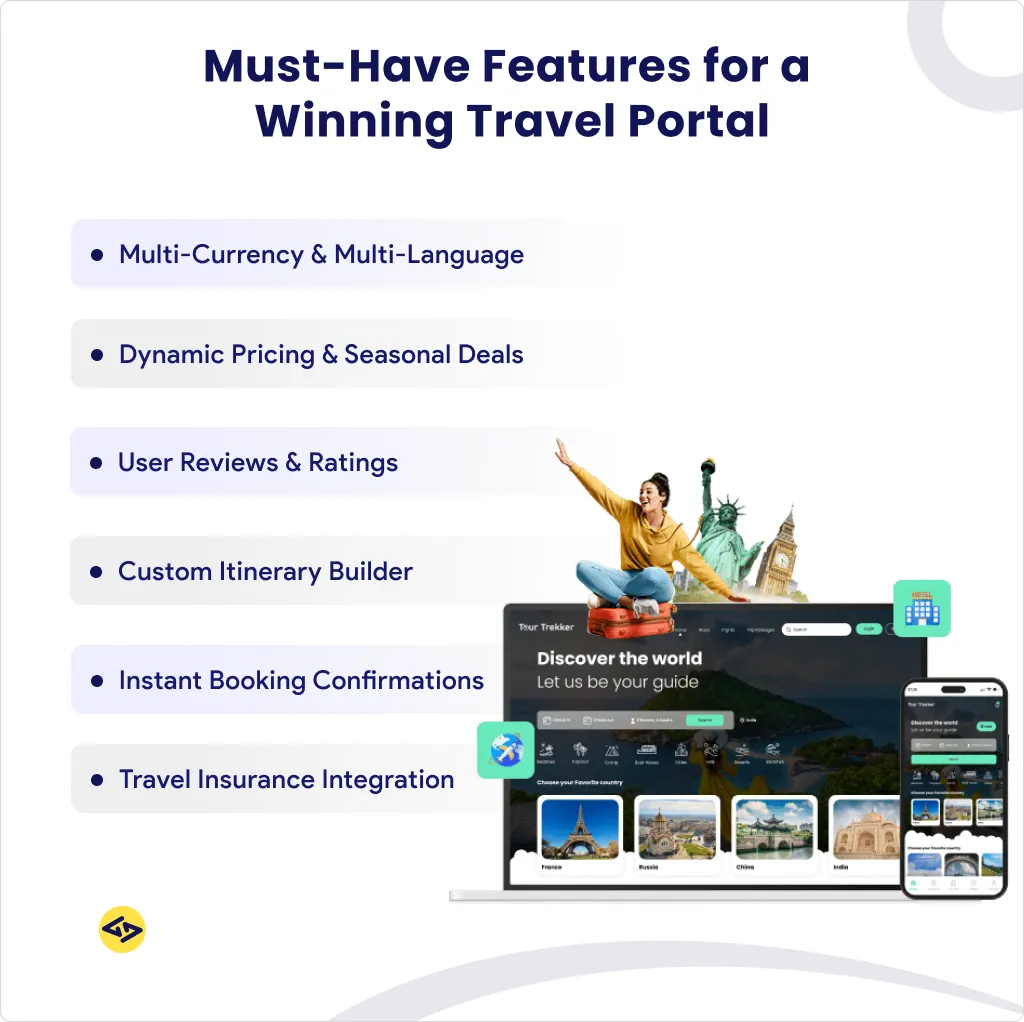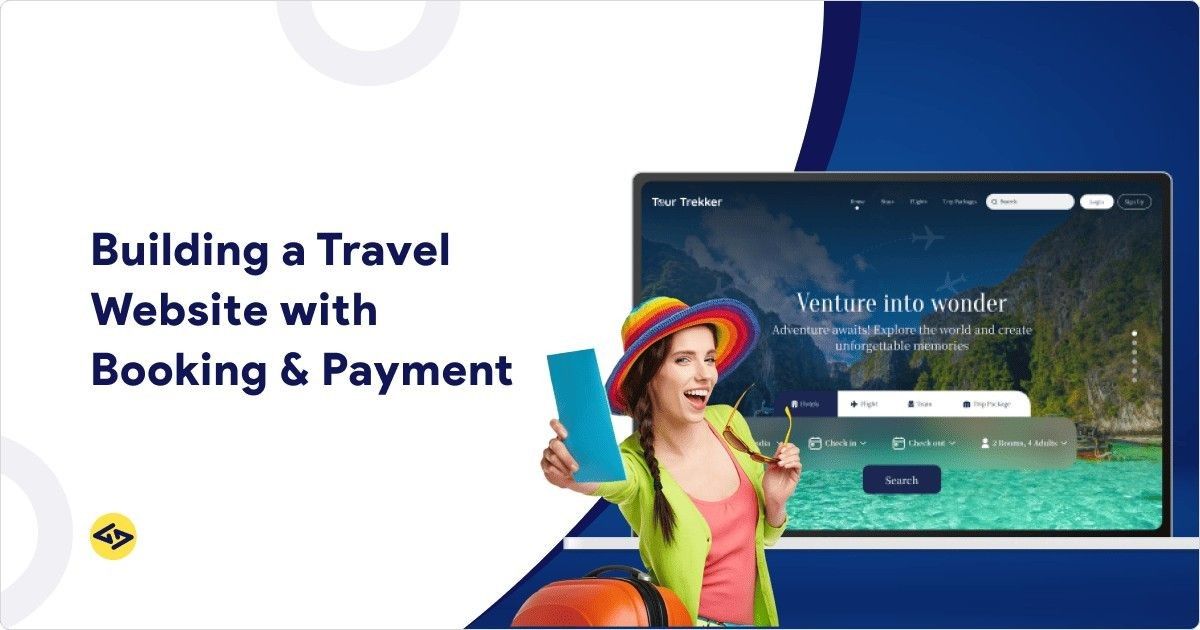The Secret to a Thriving Travel Business:
Your travel business is built on passion and incredible destinations. But today, most people book trips online. According to a recent report, over 80% of all bookings happen online. The global online travel booking service market size was valued at USD 519.1 billion in 2021 and is projected to reach USD 1.13 trillion by 2030, growing at a CAGR of 9.0% from 2022 to 2030—a clear sign of the massive opportunity. This means a basic website is not enough. It’s like a beautiful brochure with no way to buy anything. It can’t make sales or help people from all over the world.
To truly excel, you need a powerful sales machine that operates 24/7. This is where professional travel website development comes in—creating a platform that books trips for you while you focus on what you love. An easy and safe booking process is key to generating new sales and building trust with your customers. Partnering with experts in website development services ensures your platform is built with performance, security, and scalability in mind.
This guide will show you how to build that machine. We’ll walk you through every key step—you will learn about the main parts of a modern travel site, including how to use important APIs. You will also discover how to build customer trust with honest prices and good security. Ready to turn your website into a money-making engine? Let’s begin.
What Are the Core Components of a Travel Booking Website?
A successful travel website is more than just a digital storefront; it’s a complex ecosystem built on several key components that work together to deliver a smooth user experience.

Booking engine:
This is the central point of your site. A powerful booking engine offers instant reservation and real-time availability. It books your inventory, flight, hotel suite, or tour seat, and prevents double-booking.
Payment Gateway Integration:
Fast and global transactions rely on a safe payment gateway. It secures your customers and your company by masking confidential payment data.
GDS (Global Distribution System) Integration:
GDS integration is a necessity for businesses that sell flights, hotels, and car rentals (e.g., Amadeus, Sabre, or Travelport). It provides a worldwide inventory at your fingertips that enables you to have a large selection of items without managing the inventory directly. Learn more in our Guide to Building a Flight Booking App.
CMS (Content Management System):
An easy-to-use CMS must enable you to update your content, create new travel packages, post seasonal offers, and handle the blog posts; you do not need a developer to make the changes. This will make your site updated and interesting and allow for dynamic content updates.
Search & Filter Functionality:
Users are interested in rapid access to what they desire. Fine-grained search and filtering by price, dates, destination, and amenity assist users in making quicker decisions and enhance their user experience.
Mobile-Friendly Design:
An increasingly large percentage of the bookings are done with a smartphone, so a responsive and mobile-friendly design is a must. It keeps your web page flawless on any platform, whether desktop, tablet, or phone.
Why Are API Integrations Critical for Travel Websites?
The APIs (Application Programming Interfaces) are the digital connective tissue holding your site and services together, and will enable you to create a rich feature set without building all the functionalities from scratch.
GDS API Integration:
Connect to GDS providers such as Amadeus, Sabre, and Travelport and automatically access their immense global travel inventory. It will allow you to sell flights, hotels, and cars with hundreds of providers.
Third-Party Travel APIs:
In combination with the help of companies like Expedia, Booking.com, and TripAdvisor, they have APIs that will enable you to expand your offerings with hotels, tours, and activities from other providers. It enables you to showcase more hotels, tours, and activities to ensure your clients have many choices and earn a high level of commission and potential affiliate revenue.
Payment API Integration:
You will be able to process payments safely by applying a payment API of a vendor like Stripe, PayPal, Razorpay, or Adyen. Such ready-made connections are used to encrypt payments, convert currencies, and prevent fraud.
Beyond efficiency, APIs expand your inventory and ensure real-time data accuracy, saving significant development time and money and allowing you to get to market faster.
How Can You Build User Trust in a Travel Booking Website?
Building trust is the single most important factor in securing a booking. When a traveler feels confident in your site, they’re more likely to finalize their purchase. Here’s how you can build that trust from the ground up:

Create a Frictionless Booking Flow:
Booking needs to be easy and quick. Avoid lengthy forms and unneeded clicks. A progress bar can indicate to the user where they are within the step, which can make it less intimidating. Slow or complex checkout is one of the key drivers of cart abandonment because it sends a wrong message to visitors about the credibility of your business.
Ensure Transparent Pricing:
Few things erode trust faster than hidden fees. List all prices (taxes and service fees included) before the user gives their payment details. With prices disaggregated up front, customers feel they are in control of their budget.
Capitalize upon Social Proof and High-Quality Images:
Show authentic images and videos of places and the accommodation, and experiences. Do not use generic stock photos. Moreover, place customer reviews and ratings in a prominent place. Other travelers are excellent social proofs that empower new customers to make the right decisions.
Implement a Secure and Visible Payment Process:
Users are highly conscious of security at this stage. Show security badges, e.g., SSL certificates and logos of recognized payment gateways (e.g., Visa, MasterCard, PayPal). You can also briefly describe that you are PCI compliant to confirm to users that data is secured.
Provide Accessible and Proactive Support:
Make assistance to the customer accessible. Incorporating phone numbers, live chat, and email support demonstrates that you are a reliable business that supports its services. Automatic emails/SMS confirmations with itinerary information will build trust and portray you as a trustworthy partner in their plans.
For tips on building booking experiences that customers love, check our guide on How to Create a Booking App.
What Features Should Every Travel Portal Have?
To compete with the big players, your travel portal needs to offer more than just basic booking. These features will enhance user experience and drive bookings:

Multi-currency & Multi-language Options: Cater to a global audience by allowing them to view prices in their local currency and browse the site in their preferred language.
Dynamic Pricing & Seasonal Promotions: Automatically adjust prices based on demand and offer limited-time promotions to create a sense of urgency and boost sales.
User Reviews & Ratings: Social proof is powerful. Displaying user-generated reviews and ratings helps new customers make informed decisions and builds credibility.
Custom Itinerary Builder: Let users build their perfect trip by combining flights, hotels, and activities into a single itinerary, providing a more personalized experience.
Email & SMS Booking Confirmations: Instantly send booking confirmations and e-tickets via email and SMS to reassure customers and provide them with all the necessary details.
Travel Insurance Integration: Offer travel insurance as an add-on during the booking process. This provides extra value for your customers and can be an additional revenue stream for you.
What Are the Best Payment Gateway Practices for Travel Websites?
Choosing and setting up the right payment gateway is crucial for your business’s financial security and credibility.
Understand PCI Compliance:
PCI compliance is a set of security standards for businesses that handle credit card information. It’s not a choice—it’s a requirement. A good payment gateway will help you maintain compliance without you having to be a security expert.
Use Recommended Gateways:
Stick to reputable and widely trusted gateways like Stripe, PayPal, Razorpay, Adyen, and Worldpay. They offer robust security features, handle compliance, and support a wide range of currencies.
Offer Multiple Payment Methods:
Don’t limit your customers. Provide options like major credit and debit cards, local wallets (e.g., UPI in India), and even Buy Now, Pay Later (BNPL) services to appeal to a broader audience.
Have Fast Refunds & Flexible Policies:
A clear and quick refund process builds immense trust. Outline your cancellation and refund policies clearly and ensure that when a refund is requested, it’s processed without unnecessary delays.
How Can You Make a Travel Booking Website Secure?
Security isn’t just about protecting customer data; it’s about protecting your entire business from threats.
Use HTTPS & SSL Certificates: An SSL certificate encrypts all data transmitted between a user’s browser and your website’s server. This is a non-negotiable security measure and is indicated by a padlock icon in the browser address bar.
Data Encryption: Sensitive customer information, like personal details and payment data, should be encrypted both in transit and at rest on your servers.
Fraud Detection & Prevention Systems: Many payment gateways and security tools offer built-in fraud detection systems that monitor transactions for suspicious activity, helping to prevent chargebacks and financial loss.
Two-Factor Authentication (2FA): Implement 2FA for admin accounts to add an extra layer of security, making it much harder for unauthorized users to gain access to your backend.
Routine Security Audits: Regularly conduct security audits and penetration testing to identify and fix vulnerabilities before they can be exploited by malicious actors.
How Much Does It Cost to Build a Travel Booking Website?
The cost of building a travel website varies widely and depends on several key factors:
Design Complexity: A simple, template-based site will cost less than a custom, high-end design with unique branding.
Integrations: The number and type of API integrations (GDS, third-party, payment) will significantly affect the price.
Features: A site with a basic booking engine is much cheaper than one with dynamic pricing, itinerary builders, and advanced search functionality.
Security: Investing in robust security features and compliance will add to the initial cost but save you from potential legal and financial disasters down the line.
Here’s a general cost breakdown:
Small Business Travel Site (Basic): A simple site with a single booking engine and basic payment integration might cost anywhere from $5,000 to $15,000. This is a very rough estimate and can vary greatly by region and development partner.
Medium-Sized Portal (Mid-Level): A more advanced site with GDS integration, multiple APIs, and custom features could range from $20,000 to $50,000. This range is also highly variable and could be much higher depending on the specific features and integrations.
Enterprise-Level Platform (Complex): A fully custom, multi-vendor marketplace with sophisticated features and enterprise-grade security can cost $75,000 to over $200,000. The top end of this range can extend into the millions for complex, highly customized platforms.
For a deeper breakdown, see our full guide on the Cost to Build a Travel Booking App.
Why Is PCI Compliance Important for Travel Website Payment Gateways?
Payment Card Industry Data Security Standard (PCI DSS) is a set of rules that should be adhered to by all businesses handling payments, payment cards, or both, and is enforced by card brands like Visa and Mastercard. In the case of travel sites, PCI compliance is a must-have due to the following reasons:
Increased User Trust: When customers know their payment data is handled according to global security standards, they are more likely to book with you.
Legal Compliance: Non-compliance with PCI standards could lead to large fines, legal prosecution, and loss of your credit card processing capabilities.
Lower Fraud Risk: PCI compliance reduces the risk of data breaches and fraudulent activities, providing requirements on how the data should be encrypted, the network should be secured, and access must be monitored.
In short, PCI compliance isn’t just about avoiding penalties, it’s a critical part of a robust security strategy that protects your customers and your business.
Conclusion: Turning Your Travel Website Development into a 24/7 Sales Engine
Building a successful travel website today comes down to three things: Trust, Security, a Seamless Experience, and a powerful digital partner. Together, they draw customers and convert them to loyal buyers. Excellent booking system, safe payments, no hidden costs, and easy navigation matter.
The right expertise will enable you to build a travel portal that operates day and night. Partner with a team that understands these challenges. iCoderz specializes in creating custom, secure, and scalable travel platforms that drive growth and build lasting customer trust. Contact today and turn your travel vision into a reality.
Build Your Travel Website Today
Collaborate with our expert travel website development team to create a stunning site that converts visitors into loyal customers.




